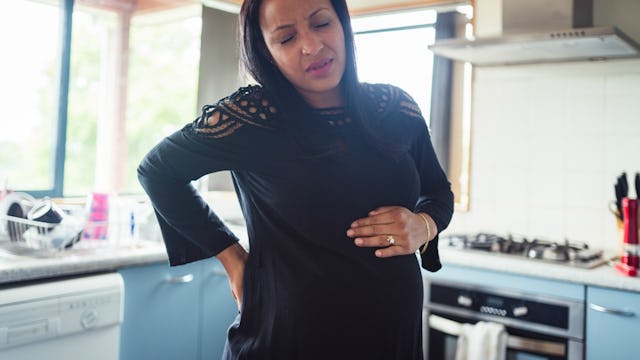The Painful Pregnancy Ailment You May Have Had (But Didn't Know Had A Name)

I was a few months pregnant with my third baby when the pain started. I noticed it when I was on my feet for a long time, or when I climbed in and out of bed. It felt like someone had kicked me square in the lady parts — really hard. For a while, I thought my pubic bone was bruised, though I couldn’t remember doing anything to it.
Since this was my third, I knew that random aches and pains can be a normal part of pregnancy. I had severe round ligament pain with my second baby that felt like someone was stabbing me in the side, but it was short-lived. This crotch pain ranged from a dull ache to a sharp pain, and it went on and on.
It hurt when I stood too long. It hurt when I walked too much. It hurt when I got in and out of the car. It hurt when I spread my legs farther than shoulder-width apart. So basically, it hurt to move.
I talked to my doctor — two of them, in fact — about this pain, and their answers were nearly identical: “It’s probably just the baby pushing down on your pelvis. It’s normal to feel some pressure down there.”
I tried to explain to them that I know what pelvic pressure feels like (hello, third baby) and that this was different. This was a sharp ache, right at the top of my pubic bone. “Yeah, all kinds of aches and pains can be normal,” they said.
I knew that. I also knew this was different. Something wasn’t right.
I’m not a doctor, but like most modern Americans, I play one on the internet. While Dr. Google may not always be reliable, he occasionally delivers. With a Google search that went something like, “Pregnant and feel like I’ve been kicked in the crotch,” I found the answer to my mystery.
It’s called symphysis pubis dysfunction. SPD for short. It sounds more like an STD, but it’s a condition where, basically speaking, the relaxin hormones work a little too well and cause excessive loosening of the pelvic bones. The joint that connects the pubic bones can separate and cause a whole range of pain in the nether regions. It’s also known as pelvic girdle pain.
I’m sorry, but “pelvic girdle pain” just sounds like you wore your Spanx too long and is not an apt descriptor for what I experienced. Unless I was careful not to walk too much or stand too much or do anything normal too much, my hoo-ha was in excruciating pain for hours.
At 6 months pregnant, I couldn’t walk around a grocery store. I had to use one of those driving carts. I’d always enjoyed being active during my pregnancies — now I couldn’t walk for longer than five minutes without paying for it the rest of the day.
Rolling over in bed caused a sharp stabbing pain. Anything that involved spreading my legs caused a sharp stabbing pain. (Yes, sex too, although at certain angles I was okay.)
I went back to the doctor and told him about my Dr. Google findings. “Yeah, that could be it,” he said. (Why didn’t you tell me that before?) He suggested getting a support belt.
I did, and it helped some. What helped more was getting a chiropractic adjustment and some acupuncture, though that didn’t solve it. I’ve read some stories of women with SPD who found significant relief from chiropractic care, but mine seemed to have no cure or even much relief.
Then I read that on rare occasions it doesn’t go away after birth. What?!
Thankfully, mine did. Almost immediately, thank the sweet heavens. I wouldn’t wish that pain on anyone.
My SPD experience is not terribly uncommon. I’ve had a hard time finding hard statistics — some sites say 1 in 300 pregnant women experience SPD, while some say up to 1 in 5. Two of my closest friends had it during one of their pregnancies. I read countless stories online of women who had it. And in a large percentage of those stories, the women’s doctors initially brushed it off as normal pregnancy aches and pains.
There is nothing normal about feeling like you had a bowling ball dropped on your pubic bone. The pain may not always be that severe (descriptions range from moderate to excruciating pain — I was one of the unlucky ones, I guess), but it’s not like normal pregnancy discomfort. If you ever felt a pain or grinding sensation in your pubic area while you were pregnant, you may have had undiagnosed SPD.
If you are pregnant and experiencing a sore pubic bone, talk to your doctor.
You’d think such a common pregnancy ailment would be better known, but it’s not exactly the kind of pain you want to tell people about. “Hi, sorry, my pubic area hurts really bad today.” And then explaining that you have something called “symphysis pubis dysfunction”? Yeah, no thank you.
If you had SPD or are dealing with it now, I’m so sorry. It totally sucks. But at least you know you’re not alone.
Solidarity, SPD sisters.
This article was originally published on